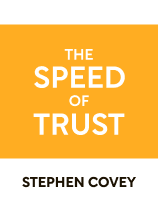

This article is an excerpt from the Shortform book guide to "The Speed of Trust" by Stephen M. R. Covey. Shortform has the world's best summaries and analyses of books you should be reading.
Like this article? Sign up for a free trial here .
What is the importance of trust in the workplace? How do high- or low-trust relationships affect your work?
In The Speed of Trust, author Stephen Covey examines all the ways trust impacts your life, from personal to professional relationships. Covey believes trust is your most valuable asset, and losing or gaining trust in the workplace has a real impact on your career.
Read on to learn the true importance of trust in the workplace, according to Covey.
Workplace Trust Accounts
Covey suggests thinking about trust as an “account” in every relationship. Every interaction in a relationship makes either a deposit into or withdrawal from both parties’ accounts. The “balance” in people’s trust accounts sets the tone for their interactions.
Considering the importance of trust in the workplace, first imagine you hire a new manager for your store. Every time she successfully handles issues independently, she makes deposits into her trust account with you. Likewise, whenever you give her additional freedom to run daily operations, you make deposits into your trust account with her.
When both parties’ account balances in a relationship are high, you can expect trust dividends from that relationship. For example, when your new manager trusts you enough to come to you with questions or admit to a mistake, you can deal with issues quickly and efficiently, and your business benefits.
When one or both parties in a relationship withdraw from a trust account, you can expect to pay trust taxes. For example, say you notice that your manager is taking shortcuts cleaning and maintaining the store. Your trust taxes are the time and resources you spend on additional training and oversight.
Covey notes that everyone’s trust accounts are unique. What constitutes a deposit into your account could be seen as a withdrawal to someone else, and what may seem like a small withdrawal to you could be huge for someone else. For example, say you tell your friend you will meet her for coffee but cancel at the last minute. To you, this might seem like a small thing, but it might be a huge withdrawal for her.
Collective Trust
Trust is integral to a functioning society, claims Covey. Yet modern society is changing so quickly that knowing when and how to extend trust can be difficult. For example, thanks to technology, much of society operates on a global scale. Companies can hire people to work as a team from all corners of the world. Consumers can go online and conduct extensive research before choosing where to spend their money, with exponentially more options. But as our personal and professional spheres grow larger, relationships can feel more and more impersonal. Considering the importance of trust in the workplace, Covey notes that people gravitate towards organizations and individuals that demonstrate their trustworthiness.
| Maintaining Trust in an Online Workplace The Speed of Trust was published before the coronavirus pandemic, which has only accelerated the trend towards remote work environments. In terms of the importance of trust in the workplace, remote work presents challenges for managers, particularly when it comes to establishing organizational trust. Managers who lead groups remotely cannot spend time organically interacting with their employees, listening to their opinions, getting their advice, and experiencing the organization’s culture in person. However, there are ways for managers to build trust in a remote workplace. In the workplace, the importance of trust can be demonstrated by managers in the following ways: prioritizing time to interact with employees both one-on-one and as a group, prioritizing dialogue (including creating space for difficult conversations) during meetings, and fostering a connection to the organization by making sure that team members feel appreciated. |
Covey notes a modern resurgence of interest in trust with more organizations recognizing the importance of trust in the workplace not as a soft or bonus skill, but as a prerequisite for success. These changes can be seen even in the largest corporations, which are now quick to advertise their company’s ethical and social commitments. Additionally, modern consumers actively look to give their money to companies that operate not just for profit but for mutual benefit. Covey adds that as a society we are becoming increasingly aware of the huge taxes that come from capitalism without trust and the huge dividends we all stand to gain when corporations and individuals seek mutual benefits.
(Shortform note: The growing call for prioritizing the importance of trust in the workplace provides a rare advantage for small businesses over larger corporations. Modern consumers are increasingly rejecting what they see as greedy capitalism, opting to give their business to smaller or local establishments. Therefore, small businesses are likely to have a built-in advantage when it comes to gaining the trust of modern customers.)

———End of Preview———
Like what you just read? Read the rest of the world's best book summary and analysis of Stephen M. R. Covey's "The Speed of Trust" at Shortform .
Here's what you'll find in our full The Speed of Trust summary :
- Why trust is the ultimate key to success
- A roadmap for building and leveraging trust
- An explanation of Steven Covey's “four cores of credibility”






